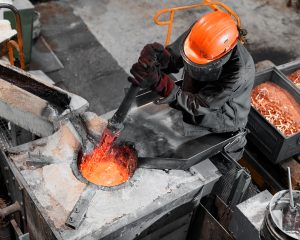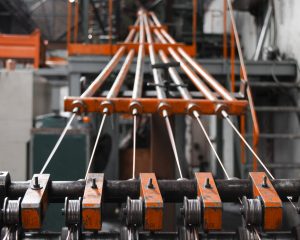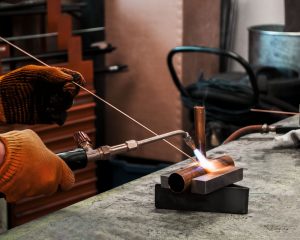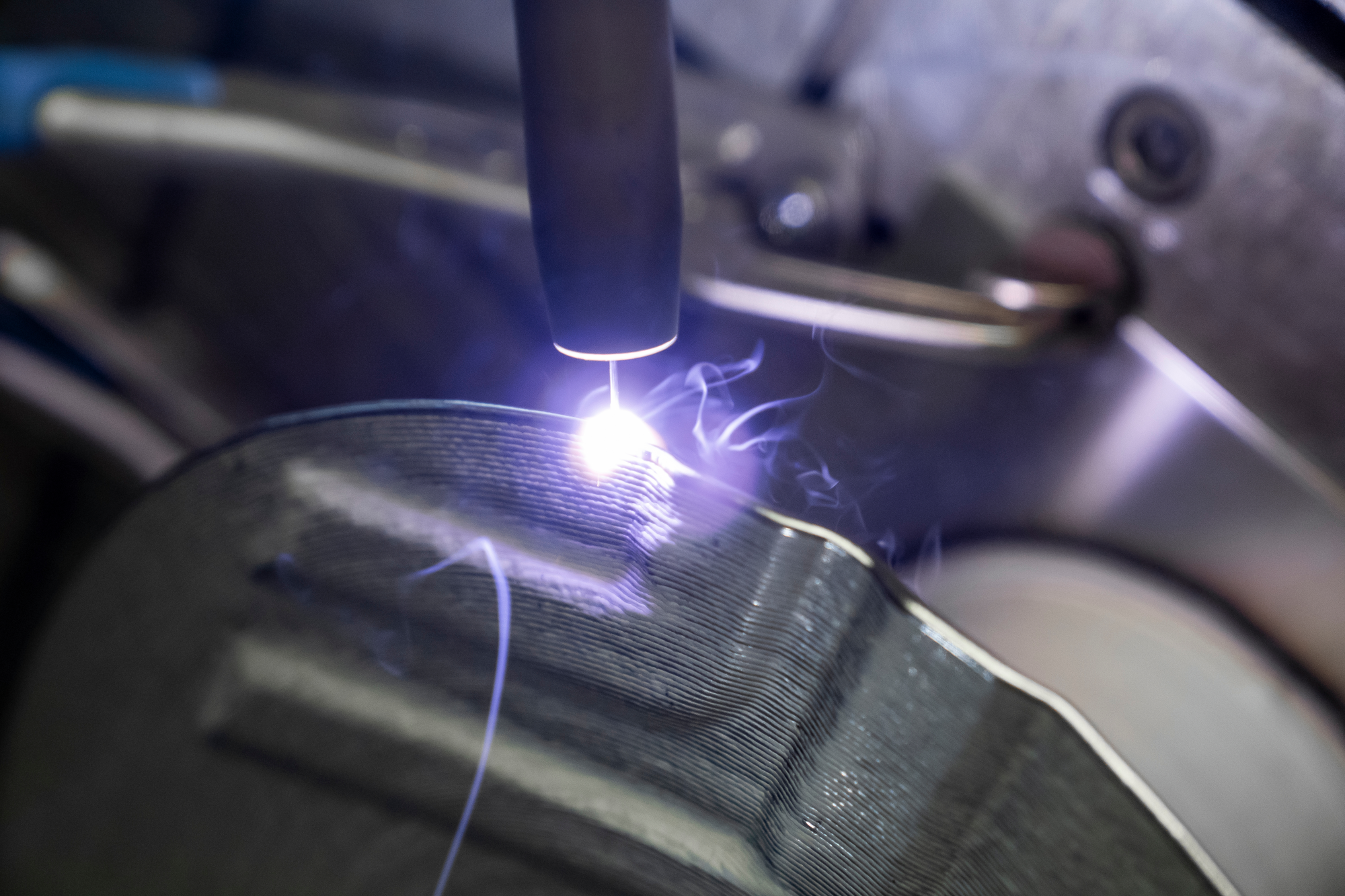Gamme complète de métaux d’apport de brasage de haute qualité
La gamme étendue de produits de brasage Selectarc inclut des alliages innovants et personnalisés pour des solutions industrielles variées.
Fort de sept décennies d’expérience, Selectarc est le leader français dans la production de métaux d’apport de brasage et propose des produits innovants, tels que le TBW (Tubular Brazing Wire) fil de brasage tubulaire en argent avec flux incorporé, le fil de brasage tubulaire en aluminium et le fil de brasage aluminium composite. Nos installations de pointe nous permettent de servir une variété de secteurs industriels clés.
Nos métaux d’apport de brasage de qualité sont fabriqués exclusivement en Bourgogne Franche-Comté (France), dans notre fonderie, seule en France à fabriquer des métaux d’apport de brasage fort (base Cu) sous différentes formes.
Secteurs d'application pour nos métaux d'apport de brasage
Nos solutions de brasage couvrent 100 % des applications, partout où la qualité et la fiabilité sont essentielles et notamment dans les secteurs suivants :
- Les énergies renouvelables
- Le transport (automobile, ferroviaire)
- HVAC (chauffage, ventilation, climatisation et réfrigération)
- La plomberie et le sanitaire
- Les outils carbure et diamantés
- Les appareils de mesure et de régulation
- Les constructions électromécaniques
- Les constructions tubulaires
Gammes de produits de brasage Selectarc
Nous offrons un large éventail de produits de brasage sous différentes formes pour s’adapter à chaque application technique :
- Fils de brasage en couronnes ou bobines
- Baguettes de brasage nues et enrobées
- Baguettes TBW : Tubular Brazing Wire, tube extrudé sans soudure avec flux incorporé
- Préformes : anneaux et formes diverses
Nos produits sont disponibles dans différents alliages : cuivre-phosphore, cuivre-phosphore-argent, argent, aluminium
- Brasures Cuivre-Phosphore : idéales pour l’assemblage Cuivre-Cuivre, disponibles en baguettes nues (et enrobées si nécessaire).
- Brasures Cuivre-Phosphore-Argent : pour une meilleure conductibilité électrique et une meilleure résistance mécanique, disponibles en baguettes nues (et enrobées si nécessaire).
- Brasures Soudo-Brasage : alliages robustes pour assemblage Acier, Cuivre, Fonte, disponibles en formats variés.
- Brasures d’Argent : pour tous métaux ferreux et cuivreux, disponibles en baguettes nues, enrobées, et préformes, incluant la technologie TBW (Tubular Brazing Wire – baguettes fourrées)
- Brasures d’Aluminium : couvrant la majorité des applications sur aluminium, incluant technologies TBW (Tubular Brazing Wire) et TBMTM (Total Brazing Mix).
Focus sur notre brasure TBW (Tubular Brazing Wire)
SELECTARC a développé et breveté une solution unique et innovante, la brasure TBW (Tubular Brazing Wire) pour optimiser vos opérations de brasage.
Fabriquée en France, la TBW est un produit 2 en 1 qui combine un tube extrudé sans soudure avec un flux incorporé, offrant ainsi une très haute fluidité et des propriétés mécaniques exceptionnelles.
Les avantages de la brasure TBW sont nombreux :
- Haute performance : Excellente résistance à la corrosion et procédé breveté garantissant une consommation d’alliage optimisée
- Facilité opératoire : Idéale pour l’automatisation des opérations de brasage, elle ne nécessite pas d’apport complémentaire de flux décapant, réduisant ainsi le nettoyage après brasage
- Sécurité de l’opérateur : Aucun contact direct avec le flux, moins de fumée et pas de projections, assurant une meilleure sécurité pour l’opérateur
Les applications sont variées : la brasure TBW est idéale pour les secteurs HVAC, énergies renouvelables, génératrices, transformateurs et moteurs électriques
Pour aller plus loin : guide complet sur le brasage dans l'industrie
Découvrez le guide sur le brasage en industrie, coécrit avec Bulane, Selectarc et le Cetim, trois acteurs majeurs dans le domaine du brasage et de l’assemblage industriel. Ce document offre une vue d’ensemble approfondie des techniques de brasage, un procédé essentiel pour de nombreuses industries. Il constitue une référence incontournable pour la maîtrise et l’optimisation des procédés de brasage pour tous les professionnels de l’industrie.
Ce guide couvre en profondeur tous les aspects du brasage industriel, incluant les définitions, les techniques, les matériaux et les gaz utilisés, ainsi que les normes et la sécurité. Il explore également les secteurs industriels concernés et les innovations récentes dans le domaine.
4 points forts de ce guide :
- Optimisation des procédés : mise en avant des techniques avancées pour optimiser les opérations de brasage industrielles et atteindre une meilleure productivité
- Sécurité accrue des opérateurs : présentation des différentes méthodes de brasage (induction, flamme oxyhydrogène …) ainsi que des formations et normes applicables au brasage
- Technologie innovante : avantages de la technologie TBW (Tubular Brazing Wire, procédé breveté) en termes de réduction des émissions de fumées et d’optimisation des opérations de brasage
- Durabilité environnementale : exploration des procédés de brasage durables répondant aux enjeux cruciaux de la décarbonation de l’industrie, comme les stations de brasage Dyoflam, permettant la réduction de 94 % de l’impact environnemental des opérations de brasage.
Engagement environnemental
Conformément à la réglementation UE n° 494/2011 du 20 mai 2011, Selectarc a éliminé l’utilisation des brasures fortes contenant du cadmium, proposant des alternatives sûres et efficaces. Pour voir l’ensemble de notre gamme de produits de brasage, consultez notre brochure panorama brasures.









